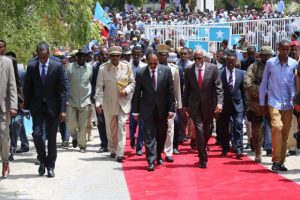Farmajo’s near-landslide election victory on 8 February is without parallel. Although the eruptions of joy across the Somali-speaking Horn and the shared jubilation of citizens and soldiers in Mogadishu is rightly giving way to more sober assessments, the view that a seismic shift has occurred will be difficult to ignore.
Ensuring that this election ushers in a new dawn, and that Farmajo’s new-found political capital is well invested, a renewed diplomatic engagement by partners on numerous fronts will be required to support national-level reform and ease regional anxieties. The upcoming London Conference on Somalia, now expected in early May, represents an opportunity to do just that.
A Popular Mandate
Many hope that Farmajo’s credibility and popular support can be channelled productively. The national reconciliation talks, aimed at healing deep wounds from the civil war that broke out in 1991, have stalled and Farmajo’s strong mandate may be what is necessary to resuscitate them.
Although the entire indirect election process was extremely corrupt, Somalis have completed a relatively credible presidential election that has resulted in a peaceful transfer of power. Farmajo’s cross-clan support – the strongest platform for any Somali president – is a rare demonstration of unity in the ethnically homogenous but clan-fractured country. The mandate is indispensable for making critical progress on multiple fronts, particularly on reconciliation, addressing corruption and finalising the constitution.
A number of factors worked in Farmajo’s favour and helped seal his remarkable victory. First, Farmajo tapped into a growing antipathy to the dominance of the Abgal, a Hawiye sub-clan that gave the country its last two presidents. Frustration among other clans was also directed at the implicit agreement between the Abgal/Hawiye and Majerteen/Darod clans that allowed them to control and share both the presidential and prime ministerial seats.
Farmajo’s victory was also helped by former President Hassan Sheikh’s decision to support the re-election of Mohamed Osman Jawari of the Digil/Mirifle clan as parliamentary speaker cost him the Digil/Mirifle vote. This tactical support was intended to scupper Sharif Hassan Sheikh Adan’s presidential campaign, since it is an unwritten rule that the president and speaker cannot hail from the same clan. This fuelled Digil/Mirifle resentment, who ended up coming together during the presidential election rounds to vote against Hassan Sheikh.
Second, Farmajo is also well liked among diaspora and youth. More than 125 of Somalia’s 283 MPs and senators are from the diaspora and 165 MPs and senators are under 35 years of age. In addition, approximately 30 per cent of the newly elected MPs are also affiliated with Islamist-leaning groups, including Salafi movements and the Muslim Brotherhood (excluding Hasan Sheikh’s Damal Jadid). These have been, for some time, against the previous president’s perceived closeness with Ethiopia and its meddling in Somali political affairs.
Third, Farmajo benefitted from a huge wave of nationalistic fervour and a widely-shared perception he could be the right person to build a robust Somali National Army (SNA), speed up the African Union Mission in Somalia (AMISOM)’s exit, stabilise security, curb interventions by neighbouring countries, and protect Somalia’s dignity and sovereignty.
High Expectations
Farmajo’s immediate task will be to manage the inordinately high expectations. Unless he takes some early steps toward fulfilling his pledges of rebuilding security forces and state institutions, tackling corruption and unifying the country, dissatisfaction could trigger a serious public backlash.
A further immediate impediment to Farmajo’s proposed domestic agenda stems from the entrenched elites. Clan leaderships comprise a form of a very corrupt “deep state” that often operate against the interests of the people. Some believe this network cut short Farmajo’s tenure as prime minister in 2011. Meaningful progress will be unlikely unless these factions are controlled through a mixture of co-option and coercion.
The elections also highlighted the extent to which covert foreign funding of politicians fuelled allegations of clientalism and has impeded Somalia’s democratic transformation. Regional countries, and the Arab states of the Gulf in particular, were widely alleged to be giving cash to the top five presidential candidates.
Managing competing foreign interests in future presidential elections and reducing the corrupting influence of illicit foreign funding must be a priority for the Farmajo government. One potential institutional solution would be to formalise the Integrity Commission, set up just days before the presidential elections with the aim of curbing bribery.

